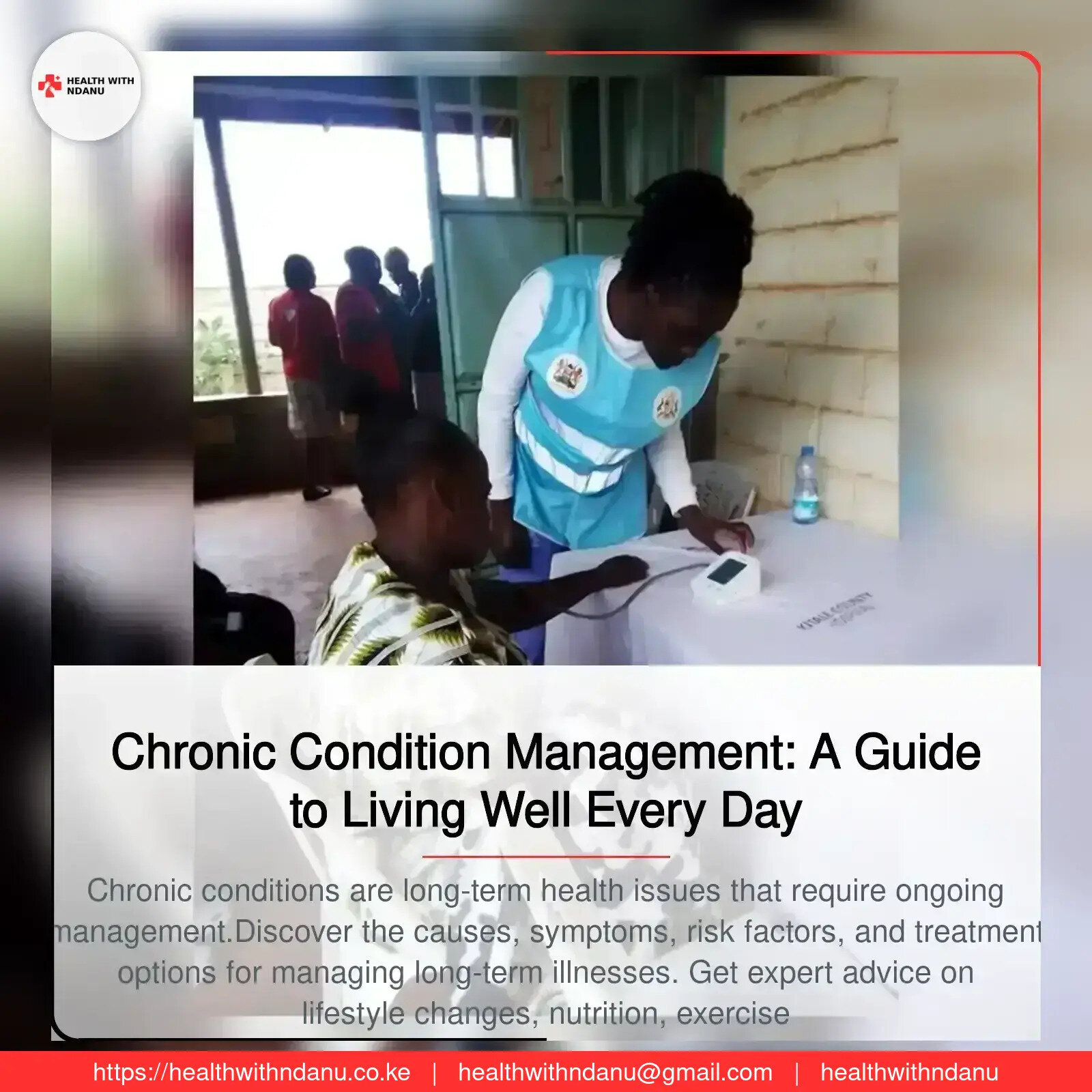Chronic Condition Management: A Guide to Living Well Every Day
- by Diana Ndanu
- 29 December, 2024
- 0 Comments
- 5 Mins



Introduction
Dealing with a chronic condition can feel overwhelming, but it doesn’t have to define your life. Whether it’s diabetes, hypertension, asthma, or arthritis, managing a chronic condition is all about finding the right balance between treatment, lifestyle adjustments, and emotional well-being.
In this article, we’ll take a conversational approach to understanding chronic condition management, offering practical tips and encouragement to help you or your loved ones live a full and healthy life
What Are Chronic Conditions?
Chronic conditions are long-term health issues that require ongoing management. They typically last for a year or more and can significantly impact your daily activities. Some common chronic conditions include:
- Diabetes
- Hypertension (high blood pressure)
- Heart disease
- Asthma and other respiratory conditions
- Arthritis
- Chronic kidney disease
- Depression and anxiety
These conditions may not have a permanent cure, but with the right strategies, they can be effectively managed.
Why Managing Chronic Conditions Matters
Taking charge of your health is crucial when living with a chronic condition. Here’s why:
1. Prevent Complications: Proper management reduces the risk of severe complications, like heart attacks or kidney failure.
2. Improve Quality of Life: With the right care, you can stay active and enjoy your favorite activities.
3. Reduce Healthcare Costs: Proactive management helps avoid costly hospital visits and treatments.
4. Enhance Emotional Well-Being: Feeling in control of your health can reduce stress and anxiety.
Understanding Your Condition
The first step in managing a chronic condition is to understand it fully. Here’s how you can do that:
1. Learn the Basics
- What causes your condition?
- What are the symptoms?
- How does it progress over time?
2. Understand Treatment Options
Know the medications you’re taking, their purpose, and possible side effects.
Explore other treatments, like physical therapy or lifestyle changes.
3. Stay Informed
Follow reputable sources for the latest research and guidelines.
Join support groups to learn from others who share your condition.
Building a Care Team
Managing a chronic condition is a team effort. Surround yourself with professionals and loved ones who can support you.
- Healthcare Providers
- Your primary care doctor
- Specialists (e.g., cardiologists, endocrinologists)
- Nurses and dietitians
- Family and Friends
Share your journey with loved ones who can provide emotional and practical support.
Support Groups
Connect with others who understand your challenges.
Daily Strategies for Chronic Condition Management
Here are some practical tips to incorporate into your daily life:
1. Follow Your Treatment Plan
- Take medications as prescribed.
- Attend regular check-ups and screenings.
2. Adopt a Healthy Diet
- Focus on whole, nutrient-dense foods like fruits, vegetables, lean proteins, and whole grains.
- Limit processed foods, sugar, and sodium, especially for conditions like hypertension or diabetes.
3. Stay Physically Active
- Engage in regular exercise tailored to your condition. Walking, swimming, or yoga are excellent options.
- Consult your doctor before starting a new workout routine.
4. Monitor Your Symptoms
- Keep track of your blood sugar, blood pressure, or other relevant metrics.
- Use apps or journals to record changes and share them with your doctor.
5. Manage Stress
- Practice relaxation techniques like deep breathing, meditation, or journaling.
- Prioritize hobbies and activities that bring you joy.
6. Get Quality Sleep
- Aim for 7-9 hours of sleep each night.
- Create a calming bedtime routine and avoid screens before bed.
7. Avoid Harmful Habits
- Quit smoking and limit alcohol consumption.
- Seek support if needed—there are resources to help you.
Overcoming Challenges
Managing a chronic condition isn’t always smooth sailing. Here are some common challenges and how to address them:
Challenge 1: Staying Motivated
Solution: Set small, achievable goals and celebrate your progress.
Challenge 2: Feeling Overwhelmed
Solution: Break tasks into manageable steps and lean on your support system.
Challenge 3: Financial Strain
Solution: Look into insurance plans, government assistance, or community resources for help.
Challenge 4: Emotional Struggles
Solution: Seek counseling or therapy to address feelings of frustration or sadness.
The Role of Technology in Chronic Condition Management
Technology can make managing your condition easier than ever:
- Health Apps: Track symptoms, medications, and appointments.
- Wearable Devices: Monitor activity levels, heart rate, or glucose levels.
- Telemedicine: Access healthcare professionals from the comfort of your home.
When to Seek Help
Always consult your doctor if:
- Symptoms worsen or new ones appear.
- You experience side effects from medications.
- You’re feeling overwhelmed or unsure about your treatment plan.
Words of Encouragement
Living with a chronic condition can be challenging, but it doesn’t mean you can’t lead a fulfilling life. Small, consistent efforts can make a big difference in your health and well-being. Remember, you’re not alone—there are people, resources, and strategies to support you every step of the way.
Take it one day at a time, and don’t hesitate to reach out for help when needed. You’ve got this!
Got Your Own Experience? Share with us
Kategoria Maarufu
Blogu Zinazotembelewa Zaidi
Daily Newsletter
Get all the top stories from Blogs to keep track.



